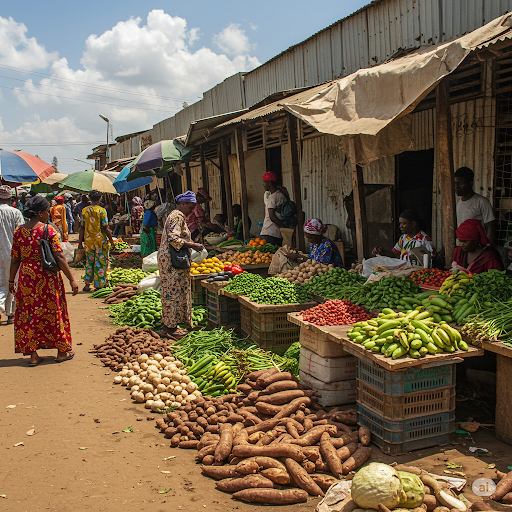Broadcasting
Cracking the Code – Unravelling the Complexities of Omnichannel Communication Excellence in the Retail Space

By James Gachie, Industry Lead at Infobip
Implementing an effective omnichannel communication strategy can provide retailers with a distinct edge in the competitive market, but the move can also present significant challenges for businesses operating within the ever-changing landscape of modern retail.

To overcome these hurdles and unlock the full potential of their omnichannel strategies, retailers should look to partner with the right communication technology specialist, invest in the appropriate technology and continually adapt to shifting customer expectation.
Omnichannel communication refers to a customer-centric approach that allows enterprises to integrate various channels and touchpoints to provide a seamless and consistent experience across all interactions with the customer.
A successful omnichannel communication strategy starts with integrating channels, meaning that a retailer must ensure that all communication channels are interconnected, working together to provide a synchronised experience for the customers. Secondly, it requires personalisation and contextualisation, which entails leveraging customer insights to deliver tailored recommendations and offers. In addition, customer engagements need to be contextualised, meaningful and targeted.
Lastly, an effective omnichannel approach must include aspects of data integration and analytics to guide decision-making regarding ongoing customer engagements. Data collected from various channels and touchpoints should be integrated into a single platform, enabling the organisation to invest wisely in the channels that exhibit the highest growth and yield the best results.
Difficult to achieve
Attaining a comprehensive omnichannel strategy is often difficult to achieve, due to the high technological complexities involved in its implementation, often becoming a major stumbling block for many businesses. For example, integrating multiple communication channels and touchpoints can be technically complex, especially in environments where multiple vendors offers different channels. However, by partnering with the appropriate communication technology partner, organisations can access a unified platform and comprehensive overview for all customer interactions across various channels, thereby simplifying the process and mitigating complexities.
Another common challenge around omnichannel implementation is that of data management and integration. For an omnichannel communication strategy to work, a company must rely on effective data management across various channels. Unfortunately, this is no easy task when coupled with the need to meet data privacy, accuracy and consistency requirements.
To implement an omnichannel communication strategy, a retailer must assess its current systems and infrastructure to identify the gaps and mutations that may hinder a seamless integration. From there, they should deploy a unified commerce platform that will act as a central hub for managing and integrating various channels and touchpoints and cross channel data synchronisation.
By synchronising customer data, organisations can establish a singular, reliable customer database that relies on first-party data to build detailed customer profiles that enables communication that is personalised and contextualised. Integration of customer data from various touchpoints further enables segmentation and customer profiling based on diverse metrics, including gender, geographical location, and age, for example.
Evolving customer expectations
However, retailers must also ensure that they stay ahead of evolving customer expectations and adapt their strategies to deliver consistent and personalised experiences across different channels in their omnichannel communication strategy. This is where personalisation at scale or hyper personalisation comes into play.
By leveraging customer data for segmentation and customer profiling, retailers can deliver a personalised experience and provide product recommendations, promotions and messaging targeted at either individual customers or segments. To achieve this at scale, companies will need to leverage Artificial Intelligence (AI) and automation, which will not only ensure that the messages reach the right individuals, but also keep profiles updated by constantly tracking customer behaviour.
To successfully implement an omnichannel communication strategy, companies should explore partnerships and collaboration, mainly because building these tools and solutions is not the core business of retailers. At the same time, retailers should also embrace cloud solutions that will allow them to scale, to be flexible and to assimilate integration across their existing solutions.
As the retail landscape moves towards conversational everything – marking, support, experience, and commerce – an experienced partner is key to supporting retailers to deliver personalised customer engagements, implement communication strategies and capitalise on the growth of conversational formats.
Broadcasting
Governor Hyacinth Alia Named Among Nigeria’s Top 50 Digital Economy MVPs for 2025

Benue State Governor, Rev. Fr. Dr. Hyacinth Iormem Alia, has been named among the “50 Most Valuable Personalities (50MVPs) in Nigeria’s Digital Economy 2025,” a prestigious recognition celebrating visionary leadership in technology-driven governance.

Governor Alia’s administration has prioritized digital inclusion and ICT development, introducing groundbreaking initiatives that position Benue State at the forefront of Nigeria’s digital economy. Under his leadership, the government has established three key institutions: the Ministry of Communications, Innovation & Digital Economy, the Benue State Digital Infrastructure Company (BDIC), and the Benue State Digital Infrastructure Services Management and Enforcement Agency (BENDISMEA).
Since assuming office, Alia has launched several digital initiatives, including training over 40,000 civil servants in e-governance tools and equipping 10,000 youths with digital skills. Additionally, the government has set up 276 e-commerce hubs across council wards to support local businesses and young entrepreneurs.
The BDIC, a core driver of Benue’s tech transformation, has spearheaded projects in digital financial inclusion, AI education, and broadband expansion. The state has also partnered with the Digital Bridge Institute (DBI) to establish digital training hubs in all local government areas, targeting 23,000 trainees annually.
Alia’s recognition as one of Nigeria’s top digital leaders will be formalized at the West Africa Convergence Conference (WACC) 2025, scheduled for May 22 at The Colosseum, Lagos. The annual event, organized by Knowhow Media, brings together policymakers and innovators shaping Nigeria’s digital future.
Speaking on the selection process, Dr. Sola Afolabi, Chairman of the 2025 Nomination Committee, praised Alia’s contribution, describing his digital initiatives as “transformational steps that set the benchmark for technology-driven governance.”
Previous editions of the 50MVPs in Nigeria’s Digital Economy have honored notable figures such as Minister of Humanitarian Affairs, Prof. Nentawe Goshwe Yilwatda, and NDPC CEO, Dr. Vincent Olatunji.
Governor Alia’s reforms reflect a broader shift towards digital governance in Nigeria, highlighting the potential of technology to drive inclusive economic growth and efficient public administration.
Broadcasting
5 Things You Absolutely Need to Know About BBNaija Season 10


Broadcasting
E-commerce Lessons for Scaling Nigeria’s Food Distribution

By Diana Tenebe, Chief Operating Officer, Foodstuff Store
Nigeria stands at the cusp of an agricultural revolution with the ambitious plan to significantly transform its food and agriculture sector through the launch of the $510 million Special Agro-Industrial Processing Zones (SAPZ), financed by the African Development Bank and development partners. Fueled by the integration of cutting-edge technologies aimed at boosting food production and ensuring national food security. However, as yields increase, a formidable hurdle remains: the efficient and scalable distribution of this bounty across the nation’s diverse landscapes, often hampered by infrastructural limitations and logistical complexities.

Dr. Bosun Tijani, the Minister of Communication, Innovation, and Digital Economy, recently called on Nigerian farmers to prepare for digital and technologically advanced farming methods, emphasising their crucial role in boosting food production and security. Building upon this call for technological integration, and to truly unlock the full potential of Nigerian agriculture and ensure increased harvests translate to accessible and affordable food for all, the sector can draw invaluable lessons from the operational prowess of e-commerce giants like Amazon. Their success in navigating complex logistics and reaching vast customer bases offers a compelling blueprint for transforming Nigeria’s food distribution network.
Amazon’s dominance in the e-commerce realm is underpinned by a meticulously crafted logistics and supply chain system. Their significant investments in sprawling fulfillment networks, coupled with the strategic deployment of technology for route optimisation and real-time inventory tracking, have created an unparalleled engine for moving goods swiftly and efficiently. Furthermore, their optimisation of last-mile delivery, integration of automation within warehouses, and a hybrid approach blending in-house capabilities with shrewd partnerships underscore their commitment to scalability. This intricate ecosystem is designed to handle massive volumes and adapt to fluctuating demands – a crucial capability that Nigeria’s agricultural sector desperately needs.
Translating these principles to the Nigerian context requires a fundamental shift towards building a resilient delivery infrastructure specifically tailored for agricultural produce. This necessitates moving beyond traditional, often inefficient methods and embracing hybrid transportation models that account for varying road conditions and geographical challenges. Imagine a network that leverages a combination of refrigerated trucks for long-haul transport, smaller vehicles for navigating local terrains, and even innovative solutions like riverine transport where feasible. Integrating technologies like GPS tracking for real-time visibility of produce movement and strategically establishing a network of collection and distribution hubs across key agricultural zones can significantly streamline the flow of goods.
Implementing robust systems for real-time tracking of harvests and produce, mirroring Amazon’s inventory management, will be crucial in minimising spoilage and maximizing freshness as food travels from farm to consumer. Moreover, forging strategic alliances with existing local logistics providers, leveraging their on-the-ground knowledge and infrastructure, can provide a vital springboard for building a comprehensive network without starting entirely from scratch.
Beyond the physical movement of goods, the power of data, a cornerstone of Amazon’s success, holds immense potential for revolutionising Nigerian food distribution. Leveraging data analytics can provide invaluable insights into regional demand patterns, allowing for more accurate forecasting of optimal harvest and distribution times. This data-driven approach can help match agricultural supply with consumer needs with greater precision, reducing waste and ensuring that the right produce reaches the right markets at the right time – much like Amazon utilizes data for personalized recommendations and understanding customer purchase behavior. Imagine farmers making informed decisions about planting based on predicted market demands or logistics providers optimizing routes based on real-time demand fluctuations.
Furthermore, adopting Amazon’s unwavering focus on customer convenience and trust is paramount, especially when dealing with perishable goods. Establishing reliable delivery schedules, ensuring the quality and freshness of produce upon arrival, and implementing transparent processes throughout the supply chain are crucial for building confidence among both farmers and consumers. This might involve implementing quality control measures at various stages, providing clear communication about delivery timelines, and potentially even exploring traceability systems that allow consumers to understand the journey of their food.
Finally, navigating the complexities and dynamism of the Nigerian market demands a long-term vision and a high degree of adaptability, mirroring Amazon’s sustained focus and agility in the ever-evolving e-commerce landscape. The Nigerian agricultural sector must be prepared to iterate, learn from its experiences, and continuously refine its distribution strategies in response to local challenges and opportunities. This requires a collaborative approach involving government agencies, agricultural organisations, technology providers, and logistics companies working together to build a sustainable and efficient food distribution ecosystem.
By strategically adapting these e-commerce-inspired lessons in logistics, technology adoption, data-driven decision-making, and customer focus to the unique context of Nigerian agriculture, the nation can forge a distribution system capable of efficiently handling increased production. This transformative approach is not merely about moving food; it’s about ensuring that the fruits of Nigeria’s agricultural advancements reach every corner of the country, contributing significantly to food security, mitigating the rising cost of food, and ultimately cultivating a thriving and efficient agricultural future for all Nigerians.

 General News2 days ago
General News2 days agoNITDA Advocates Strategic Partnership in Research to Unlock Nigeria’s Digital Potential

 News3 days ago
News3 days agoStakeholders Seek Strengthening of Digital Infrastructure @ IoT West Africa

 Telecom3 days ago
Telecom3 days agoAirtel Introduces Full Shopping Experience Within My Airtel App

 General News3 days ago
General News3 days agoJumia Expands Delivery Service to Nigeria

 General News3 days ago
General News3 days agoLagos Slush’D 2025 To Promote Creativity among Start-ups

 E-Business3 days ago
E-Business3 days agoQ1 2025 .ng Domain Name Statistics Reflect Nigeria’s Advancing Digital Landscape

 Telecom2 days ago
Telecom2 days agoGSMA Urges Governments to Prioritise Affordable Spectrum Costs to Support Global Digital Growth

 Telecom2 days ago
Telecom2 days agoSophos Launches MSP Elevate Program to Boost MSP Growth and Profitability
















